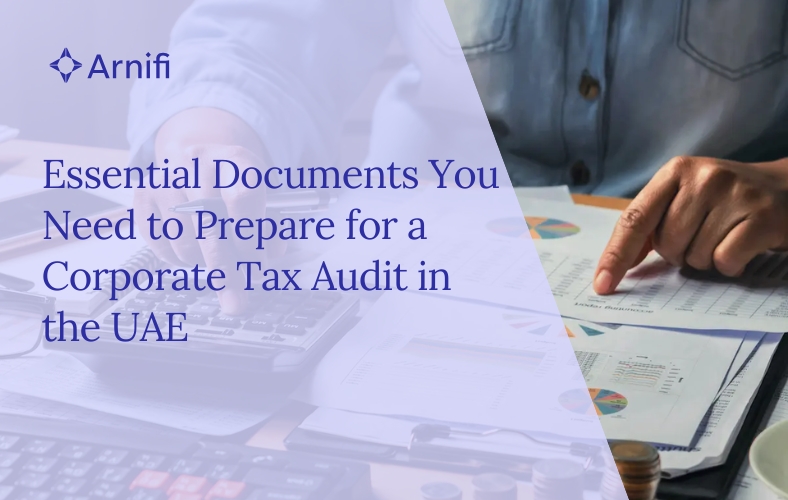Essential Documents You Need to Prepare for a Corporate Tax Audit in the UAE
by Shethana Jun 03, 2025  5 MIN READ
5 MIN READ

Since the implementation of the Federal Corporate Tax in the UAE through Federal Decree-Law No. 47 of 2022, businesses are now required to conduct themselves in compliance with the law. One of the most important obligations is that of being prepared for a corporate tax audit by the tax authorities. In order to avoid fines and ensure audits are carried out flawlessly, businesses will need to have their documents stored in the right place and make them easily accessible.
Through this article, we are going to break down the materials you need, the time of retention, and how to be audit-ready into simple steps for you.
Table of contents
Why Are Documents Important for a Corporate Tax Audit?
When the FTA audits a business, they are looking to see if it is correct in reporting its income, expenses, and taxes. The only way to prove your facts to them is to document all your financial activities during the tax period.
In the absence of proper documents, the FTA would be unable to verify your tax returns, which ultimately could lead to fines and the reputation of your business being dragged through the mud. That’s why keeping clean records is not only a legal obligation but also a way to guard your company against harm.
What Documents Should You Keep?
The UAE corporate tax law doesn’t list every single document you must keep, but the FTA expects you to maintain records that clearly support what you reported in your tax returns.
Here are the key types of documents to keep:
- Transaction Records: Details of all sales, purchases, and payments made during the tax period.
- Business Assets: Lists of equipment or property your business bought or sold.
- Liabilities: Records of money your business owes.
- Inventory: A stock count at the end of the tax period.
Along with these, you should keep supporting documents such as:
- Bank statements showing money moving in and out.
- Loan or financing agreements.
- Sales and purchase ledgers.
- Invoices and receipts proving income and expenses.
- Delivery notes and order records.
- Any business-related correspondence.
You don’t have to keep these in paper form. Digital copies, like scanned invoices or PDFs, are perfectly acceptable as long as they are clear and easy to access when requested.
Can You Use Digital Copies?
Yes, the FTA permits the use of digital copies to maintain the records. They are practical for businesses because it is more convenient for them to store and manage electronic files than it is to maintain physical papers.
It is, therefore, of great necessity though, to secure and back your digital documents up. Remember to always use reliable cloud storage or accounting software for quick and safe document savings, organization, and retrieving.
How Long Do You Need to Keep Your Records?
According to the FTA, all tax-related records are to be held by the business for seven years from the date the tax period stops.
By way of illustration, if your tax year finished in December 2023, those papers should stay with you until December 2030.
In case you maintain a cash accounting system, by which you record income only when payment is received, the seven-year period is counted from the payment date, not the invoice date.
The correlation brings to mind the fact that were the FTA to audit you, you would definitely manage to provide the supporting evidence, even if the tax period were several years back.
What Happens If You Don’t Keep Proper Records?
Failing to keep the required documents can lead to serious consequences:
- The FTA can fine you AED 10,000 for the first violation.
- If you repeat the violation within 24 months, the fine doubles to AED 20,000.
Besides fines, missing documents can cause audits to take longer and may trigger further investigations.
Poor record-keeping can also harm your reputation with tax authorities, making future dealings more difficult.
Simple Steps to Stay Audit-Ready
Keeping your records ready doesn’t have to be hard. Here are some easy ways to stay organized and compliant:
- Use Accounting Software: Digital tools like QuickBooks or Xero can help automatically track and organize your transactions.
- Scan Paper Documents: If you get paper invoices or receipts, scan them and save them in digital folders organized by year and type.
- Organize Your Files: Create separate folders for bank statements, invoices, contracts, and other important documents.
- Review Your Records Regularly: Check your files every few months to make sure everything is complete and accessible.
- Get Expert Help: Accountants and tax consultants who understand UAE laws can guide you and help avoid mistakes.
How Arnifi Can Help You Stay Compliant
At Arnifi, we help businesses in the UAE navigate the new corporate tax system with confidence. Here’s how we support you:
- Accounting & Tax: Our experts prepare and organize your financial records, ensuring they meet FTA standards.
- Post-Setup Compliance: We track important deadlines and documents so you’re always prepared for an audit.
- Digital Recordkeeping: We use tech-driven solutions to help store, categorize, and access your data when you need it most.
- Visa & Licensing Support: Our end-to-end services ensure your tax, licensing, and visa documentation all align smoothly.
Book a consultation with Arnifi today and let us help you prepare for your next audit—before it even begins.
Top UAE Packages

Related Articles
Top UAE Packages



